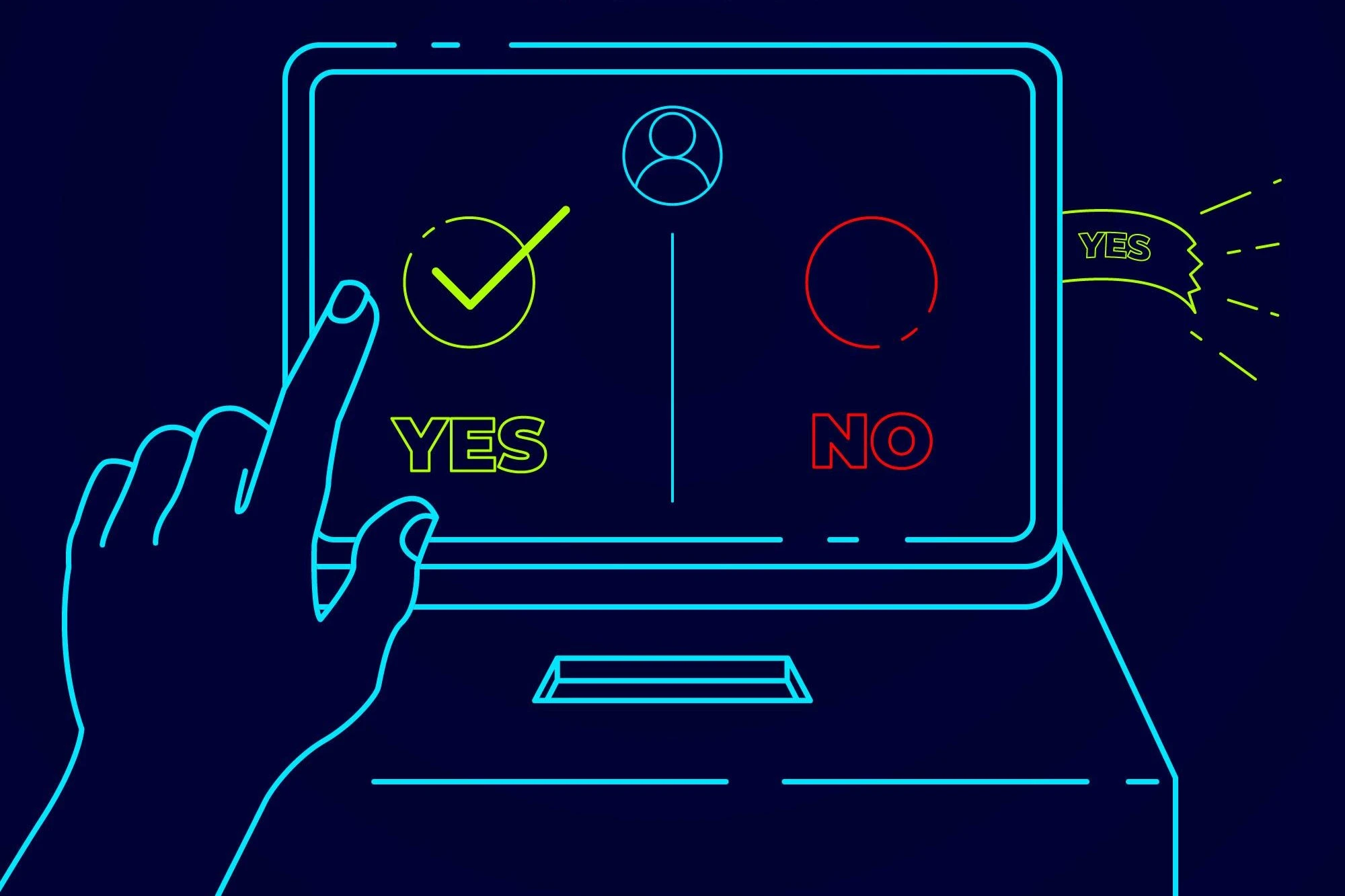Digital voting systems have been a topic of significant interest in recent years, particularly as nations strive to improve the security, transparency, and efficiency of their electoral processes. As traditional voting methods face increasing scrutiny due to concerns over fraud, hacking, and voter disenfranchisement, blockchain technology has emerged as a promising solution. This article delves into the role of blockchain in enhancing digital voting systems, exploring its potential to revolutionize how we conduct elections.
Understanding Blockchain Technology
What is Blockchain?
Blockchain is a decentralized digital ledger that records transactions across multiple computers. These records, known as blocks, are linked together in a chain through cryptographic hashes, forming a secure and immutable database. Each block contains a list of transactions, a timestamp, and a reference to the previous block, ensuring that the data cannot be altered without changing every subsequent block.
Key Features of Blockchain
| Feature | Description | Benefits |
| Decentralization | Unlike traditional databases managed by a central authority, blockchain operates on a network of nodes where each participant has access to the entire database. | Reduces risk of single points of failure, enhances resilience, and distributes control. |
| Transparency | All transactions are visible to network participants, promoting openness and allowing users to verify transactions. | Increases trust among participants and enables easy auditing and verification. |
| Immutability | Once data is recorded on the blockchain, it cannot be altered or deleted, making it resistant to tampering and fraud. | Ensures data integrity and historical accuracy, making records tamper-proof. |
| Security | Blockchain uses advanced cryptographic techniques to secure data, ensuring that only authorized participants can execute transactions. | Protects data from unauthorized access and ensures the confidentiality of transactions. |
Types of Blockchain Networks
| Type | Description | Examples | Use Cases |
| Public Blockchain | Open to anyone, where all participants can view and verify transactions, fostering transparency and inclusivity. | Bitcoin, Ethereum | Cryptocurrency, public record-keeping |
| Private Blockchain | Restricted to a specific group of participants, often within organizations, for controlled and private use. | Hyperledger Fabric, Corda | Internal business processes, supply chain management |
| Consortium Blockchain | Governed by a group of organizations, combining elements of both public and private blockchains for collaborative use. | Enterprise Ethereum Alliance, B3i | Inter-organizational collaboration, joint ventures |
Challenges in Traditional Voting Systems
Security Vulnerabilities
Traditional voting systems, whether paper-based or electronic, are susceptible to various security threats. These vulnerabilities can undermine the integrity and reliability of elections:
- Tampering with Ballots
Physical ballots are vulnerable to tampering, alteration, or destruction. This can lead to incorrect vote counts or the loss of votes entirely. - Hacking of Electronic Systems
Electronic voting machines and databases can be targeted by cyberattacks. Successful breaches can compromise vote counts and lead to inaccuracies in election results. - Voter Fraud
Issues such as double voting, vote buying, and impersonation pose significant risks. These types of fraud can erode trust in the electoral process and affect the fairness of elections.
Lack of Transparency
Transparency is a major concern in many electoral systems. Often, voters have no means to verify whether their votes were counted correctly or whether the results are accurate. This lack of transparency can lead to widespread mistrust and skepticism about the electoral process.
Accessibility Issues
Traditional voting methods can be particularly challenging for certain groups:
- Disabilities
Voters with disabilities may face barriers to casting their ballots, such as inaccessible polling stations or lack of assistive technology. - Remote Communities
Individuals living in remote or underserved areas might struggle to reach polling places or face delays in mail-in ballots. - Expatriates
Citizens living abroad may find it difficult to participate in elections due to complicated absentee voting procedures or restrictions.
High Costs and Logistical Challenges
Conducting elections using traditional methods involves significant costs and logistical hurdles:
- Printing Ballots
The process of printing and distributing ballots requires substantial financial resources and coordination. - Staffing Polling Stations
Hiring and training personnel to manage polling stations adds to the overall cost of elections. - Transporting Materials
The logistics of transporting ballots, voting machines, and other materials can strain public resources and complicate the electoral process.
How Blockchain Can Enhance Digital Voting Systems
Increased Security Through Cryptography
Blockchain’s cryptographic foundation offers a robust security framework for digital voting systems. Advanced encryption techniques ensure that votes are securely recorded and transmitted, significantly reducing the risk of tampering or unauthorized access. End-to-end encryption protects votes from the moment they are cast until they are tallied, and digital signatures verify voter identities and secure each vote, further safeguarding the integrity of the process.
Immutability and Auditability
Blockchain’s immutability guarantees that once a vote is recorded, it cannot be altered, which is crucial for preserving the integrity of election results. This feature ensures that each vote is permanently logged on the blockchain, making data manipulation nearly impossible. Transparent auditing capabilities allow election results to be traced and verified independently, enhancing trust and reducing the potential for fraud.
Decentralization for Reduced Manipulation
Decentralization in blockchain voting systems eliminates the need for a central authority, which reduces the risk of manipulation by corrupt officials or hackers targeting a single point of failure. The distributed nature of blockchain means that multiple nodes work together to verify each vote, making it exceedingly difficult for any single entity to alter the results. This absence of centralized control also significantly lowers the chances of systemic manipulation.
Enhancing Transparency and Trust
The transparent nature of blockchain voting systems allows all participants to verify the accuracy of the voting process. A publicly accessible ledger means that anyone can review the entire voting record, facilitating independent verification and fostering greater trust in the electoral process. Real-time monitoring by election observers and watchdogs can quickly identify and address any irregularities, ensuring a fair and transparent process.
Improving Accessibility
Blockchain technology can significantly enhance voting accessibility by enabling remote and online voting options. This is particularly beneficial for disabled individuals, who can vote from home, as well as citizens in remote communities who can participate without traveling long distances. Additionally, expatriates and overseas citizens can securely cast their votes online, ensuring their involvement in national elections and maintaining their right to participate in the democratic process.
Cost-Effective and Efficient
Implementing blockchain in digital voting systems can lead to substantial cost savings compared to traditional voting methods. The digitization of the voting process reduces the need for physical resources like paper, ink, and transportation, thereby cutting down on expenses. Moreover, blockchain can streamline various aspects of the voting process, automate tasks, and minimize the potential for human error, resulting in a more efficient and cost-effective electoral system.
Case Studies: Blockchain in Action for Voting
Sierra Leone: A Landmark Blockchain Election
In 2018, Sierra Leone made headlines by becoming the first country to implement blockchain in a national election. The country used blockchain to verify the results of its presidential election, demonstrating the technology’s potential to enhance transparency and trust in the voting process.
- Implementation: Blockchain was used to tally votes from the Western District, one of the country’s most populous regions.
- Outcome: The blockchain system provided a tamper-proof record of the votes, which could be independently audited to verify the accuracy of the results.
West Virginia: Blockchain Voting for Military Personnel
In 2018, West Virginia became the first U.S. state to allow military personnel stationed overseas to vote using a blockchain-based mobile application. This pilot program was designed to address the challenges faced by military voters, such as delays in receiving and returning absentee ballots.
- Security Measures: The blockchain app used biometric authentication and end-to-end encryption to secure votes.
- Results: The pilot was deemed a success, leading to discussions about expanding blockchain voting to more citizens in future elections.
Estonia: A Pioneer in Digital Voting
Estonia is widely recognized as a global leader in digital governance, including its use of blockchain for secure voting. The country has implemented a blockchain-based voting system as part of its e-Residency program, allowing citizens and e-residents to participate in elections from anywhere in the world.
- Blockchain Integration: Estonia uses blockchain to secure the digital identities of voters and to ensure the integrity of the voting process.
- Impact: The system has significantly increased voter turnout, particularly among expatriates, and has been praised for its transparency and security.
Advantages of Blockchain-Based Voting Systems
Enhanced Security and Fraud Prevention
Blockchain’s advanced security features provide a strong defense against electoral fraud. Its immutable nature ensures that once a vote is cast, it cannot be altered or deleted, which significantly reduces the risk of tampering. Additionally, blockchain’s decentralized structure minimizes the risk of hacking by eliminating single points of failure.
Transparency and Trust
Blockchain’s transparency enhances trust in the electoral process by allowing independent verification of votes and election results. All transactions are publicly accessible, enabling voters and observers to confirm the accuracy of the voting process. Furthermore, blockchain facilitates comprehensive auditing of election results, making it easier to detect and address any irregularities.
Increased Voter Participation
Blockchain technology can boost voter participation by providing remote and online voting options. This convenience is particularly beneficial for individuals with disabilities, those living in remote areas, and expatriates. By making voting more accessible, blockchain helps reduce voter suppression and ensures that all eligible citizens have the opportunity to participate.
Efficiency and Cost Savings
Blockchain can streamline the voting process, leading to significant cost savings. Automated processes for vote counting, verification, and auditing reduce the time and effort required for election management. Additionally, by eliminating the need for paper ballots, polling stations, and manual counting, blockchain reduces operational costs associated with elections.
Potential Challenges and Considerations
Technical Complexity and Implementation
Despite its advantages, implementing blockchain in digital voting systems is not without challenges. The technology is complex, and integrating it with existing electoral infrastructure requires careful planning and expertise.
- Technical Expertise: Developing and maintaining a blockchain voting system requires a high level of technical knowledge, which may be lacking in some regions.
- Integration with Legacy Systems: Existing voting infrastructure may not be compatible with blockchain technology, requiring significant investment in new systems and training.
Scalability Issues
Blockchain networks can face scalability challenges, particularly when handling a large number of transactions simultaneously. This is a critical consideration for national elections, where millions of votes need to be processed efficiently.
- Transaction Speed: Some blockchain networks may struggle to process a high volume of transactions quickly, leading to delays in vote counting and result reporting.
- Network Congestion: High demand on the blockchain network during an election could lead to congestion, affecting the system’s performance and reliability.
Privacy Concerns
While blockchain offers transparency, it also raises concerns about voter privacy. Ensuring that votes remain anonymous while maintaining the ability to audit results is a complex balancing act.
- Anonymity vs. Transparency: Designing a system that keeps votes anonymous while allowing for public verification of results is a significant challenge.
- Data Protection: Ensuring that voter data is protected from unauthorized access is critical, particularly in light of growing concerns about data privacy.
Regulatory and Legal Challenges
The adoption of blockchain voting systems may face regulatory and legal hurdles. Governments and electoral bodies must navigate complex legal frameworks to ensure that blockchain-based elections comply with existing laws and regulations.
- Legal Compliance: Blockchain voting systems must adhere to national and international election laws, which may require significant changes to existing regulations.
- Regulatory Uncertainty: The relatively new nature of blockchain technology means that there is often a lack of clear regulatory guidance, creating uncertainty for those looking to implement blockchain voting systems.
Future Outlook: Blockchain and the Evolution of Voting
Potential for Global Adoption
As blockchain technology matures, its adoption in digital voting systems is likely to increase. The potential benefits of enhanced security, transparency, and efficiency make blockchain an attractive option for electoral reform worldwide. Countries around the world are exploring the use of blockchain for voting, with pilot projects and trials being conducted in various regions. As more countries adopt blockchain voting systems, there may be moves towards standardizing the technology and best practices, facilitating broader adoption.
Innovations and Advancements
The field of blockchain technology is constantly evolving, with new innovations that could further enhance its application in voting systems. Advances in scalability, privacy, and usability are likely to make blockchain voting systems more practical and effective. Emerging technologies, such as Layer 2 solutions, could address scalability issues by processing transactions off-chain, reducing the load on the main blockchain network. Advances in privacy-preserving techniques, such as zero-knowledge proofs, could help address concerns about voter anonymity while maintaining transparency. Improving the usability of blockchain voting platforms is critical to ensuring that they are accessible to all voters, regardless of their technical expertise.
Integration with Other Technologies
Blockchain is likely to be integrated with other emerging technologies, such as artificial intelligence (AI) and the Internet of Things (IoT), to further enhance digital voting systems. These integrations could offer new ways to secure and streamline the voting process. AI could be used to automate the auditing of election results, identifying irregularities and ensuring that votes are counted accurately. IoT devices could be used to create secure, tamper-proof voting terminals that integrate with blockchain systems, providing a seamless voting experience.
Addressing Ethical and Social Implications
As blockchain-based voting systems become more prevalent, it will be important to consider the ethical and social implications of this technology. Ensuring that blockchain voting is accessible, equitable, and free from bias will be critical to its success. Efforts must be made to ensure that blockchain voting systems do not exacerbate the digital divide, particularly in regions with limited access to technology. Blockchain voting systems must be designed to be inclusive and accessible to all citizens, regardless of their socio-economic status or technological proficiency. Policymakers and technologists must work together to ensure that blockchain voting is used ethically, with a focus on enhancing democracy and protecting voter rights.




